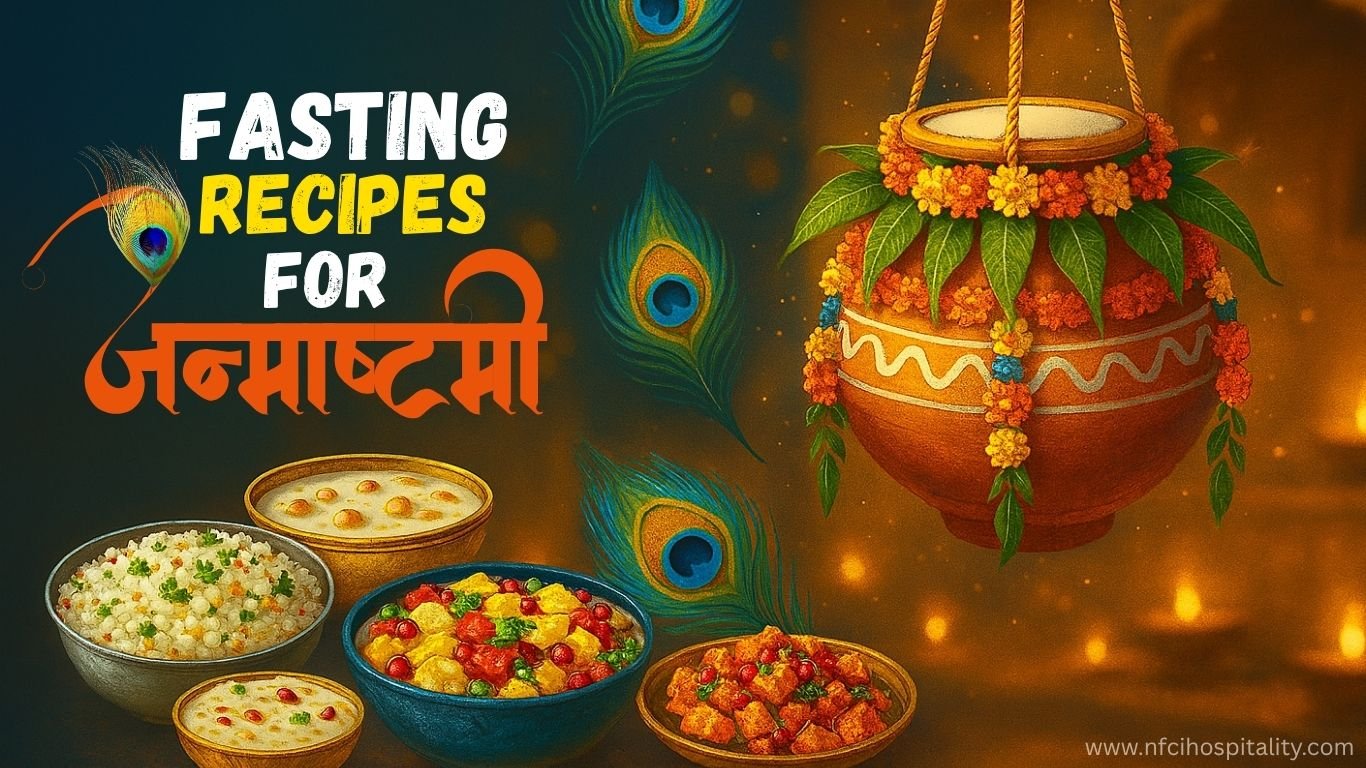
Fasting Recipes for Janmashtami 2025: Tasty and Healthy
A blessed season when the atmosphere is filled with the fragrance of fresh flowers, the soft sound of ringing bells, and melodious chants of “Hare Krishna” in every home and temple. Yes, the celebration of Lord Krishna’s birth has arrived – Krishna Janmashtami!
Across India, Hindu Devotees prepare to celebrate the divine birth of the Lord Krishna by decorating temples, and enacting Raslila, depicting the playful and profound aspects of Lord Krishna’s life. With hearts full of bhakti, devotees observe fasts to seek the blessings of “Kanha” while embracing traditions.
In this blog, we will explore delicious vrat-friendly recipes that make your fasting delightful and the essential rules of Janmashtami fasting that hold deep significance in Hindu culture.
Significance of Janmashtami
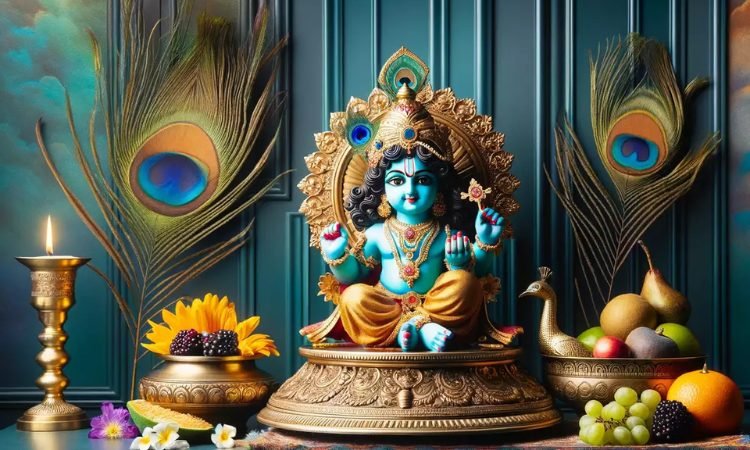
Janmashtami is one the most celebrated festival in Hinduism that symbolizes the divine birth of Lord Krishna, the eighth incarnation of Lord Vishnu who came to earth to restore justice and dharma. This festival represents the victory of good over evil.
Why is Janmashtami Celebrated?
Lord Krishna’s birth was destined to end the injustice of Kansa and begin the peace and harmony. He took birth in Mathura on Ashtami of the Krishna Paksha (month of Bhadrapada). The deeper meaning of Janmashtami lies in Lord Krishna’s teachings. His life teachings have inspired generations to live with love, compassion, righteousness and overcome ego.
To learn about his life, you can read Bhagavad Gita, Srimad Bhagavatam, or Vishnu Purana.
Why Fasting on Janmashtami is Important (Spiritual & Health Reasons)?
Spiritual Significance:
Devotees observe fasts to seek the blessings of Lord Krishna. It is believed that fasting on Janmashtami invites divine blessings and brings inner peace. Observing vrat on this festival purifies the mind and body while honouring Lord Krishna. Krishna Devotees feel detached from materialistic desires by focusing on bhajans and prayers.
Health Benefits:
From a health perspective, fasting is good for digestive system as it gives break from food and supports detoxification. This can improve metabolism when done mindfully. Consuming sattvic meals during the fast keeps the body energized.
10 Easy & Delicious Vrat Recipes for Janmashtami
Here are some dishes you can eat while observing your fast:
1. Sabudana Khichdi
A classic vrat dish, made with sabudana (tapioca pearls), peanuts, and mild spices.
Tip: Use ghee for authentic taste and energy boost.
Ingredients:
- 1 cup sabudana (soaked for 5-6 hrs)
- 2 tbsp ghee
- 2 boiled potatoes (chopped)
- ¼ cup roasted peanuts (crushed)
- 1 tsp cumin seeds
- Rock salt to taste
- Green chilies (optional)
Recipe:
- Heat ghee and add cumin seeds.
- Add boiled potatoes, stir for 2 mins.
- Add soaked sabudana, salt, crushed peanuts.
- Cook on low flame till sabudana turns translucent.
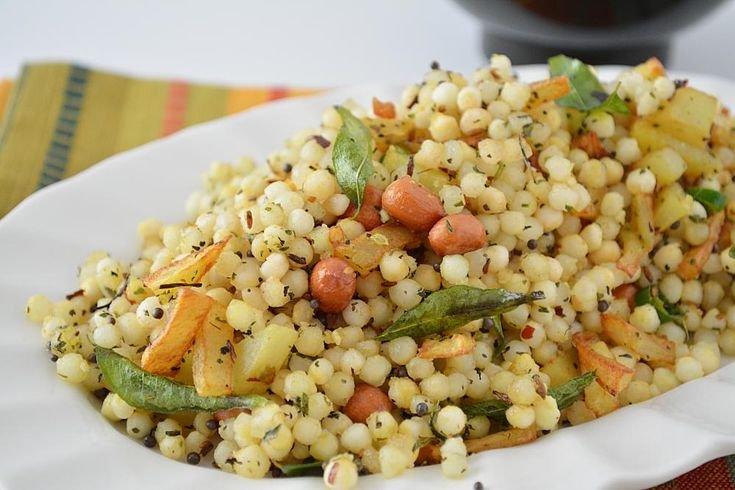
2. Fruit and Nut Yogurt Bowl
Fresh seasonal fruits mixed with creamy yogurt and topped with nuts.
Perfect for: Quick energy and hydration.
Ingredients:
- 1 cup fresh curd
- 1 banana, sliced
- 1 apple, chopped
- 5–6 almonds, chopped
- 1 tsp honey (optional)
Recipe:
- Whisk curd until smooth.
- Add chopped fruits and nuts.
- Mix well and drizzle honey if needed.
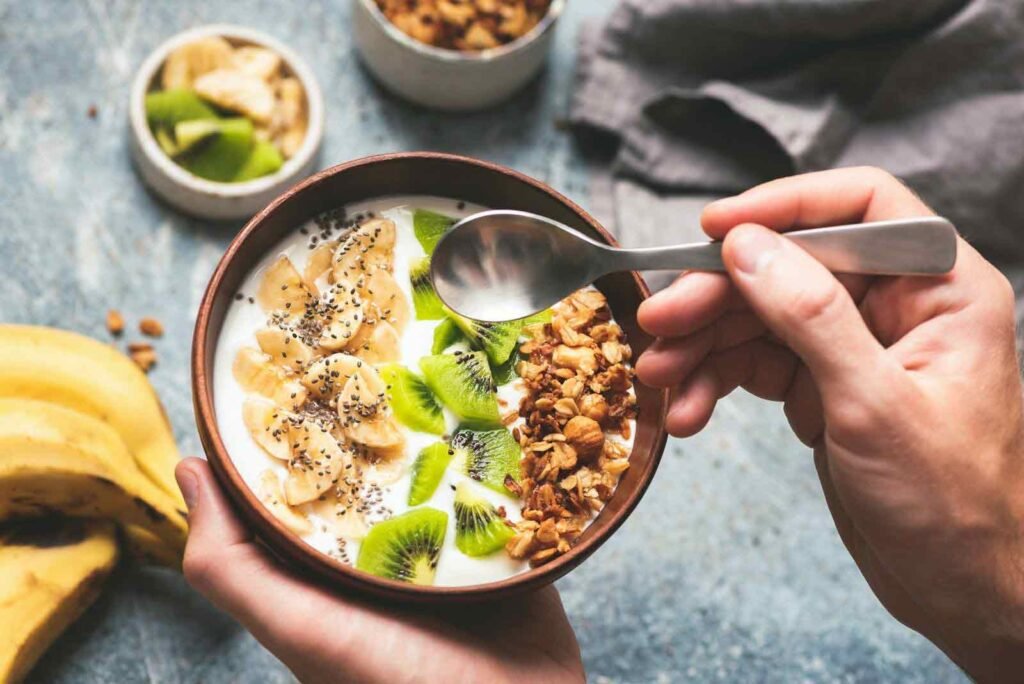
3. Makhana Kheer
Roasted fox nuts simmered in milk with a hint of cardamom and dry fruits.
“Thoda meetha, thoda sehatmand – vrat ke liye best!”
Ingredients:
- 1 cup makhana (fox nuts)
- 2 cups milk
- 2 tsp ghee
- 2 tbsp sugar
- Cardamom powder
- Chopped dry fruits
Recipe:
- Roast makhana in ghee until crisp.
- Boil milk, add makhana and cook until soft.
- Add sugar, cardamom, and dry fruits.
- Simmer for 5 mins and serve warm.
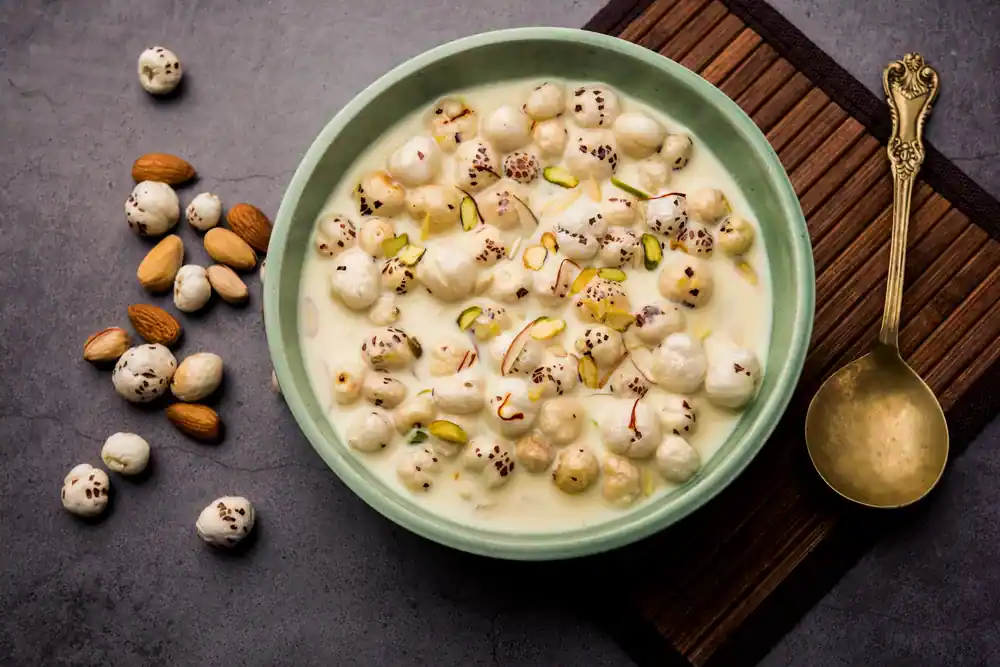
4. Poori with Aloo Sabzi
Rajgira (amaranth) flour pooris paired with tangy, vrat-friendly potato curry.
Healthy twist: Fry in less oil or opt for baked pooris.
Ingredients (Poori):
- 1 cup rajgira flour
- Boiled potato (mashed)
- Rock salt, water
Ingredients (Sabzi):
- 2 boiled potatoes
- 1 tsp cumin
- Rock salt, green chilies
- Vrat spices
Recipe:
- Knead poori dough with flour, potato, salt, and water.
- Roll and fry pooris.
- For sabzi: sauté cumin, chilies; add potatoes and spices; cook for 5–7 mins
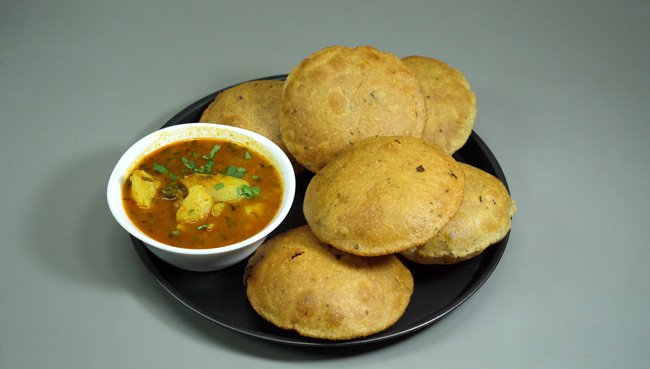
5. Sama Rice (Vrat Rice) Pulao
Made from barnyard millet, this rice alternative is rich in fiber and easy to digest. Add veggies like carrots and green beans for color and nutrition.
Ingredients:
- 1 cup sama rice (barnyard millet)
- 1 cup chopped vegetables
- 1 tsp cumin
- 1 tbsp ghee
- Rock salt
Recipe:
- Heat ghee, add cumin and veggies.
- Sauté for 2 mins, add rinsed sama rice and 2 cups water.
- Add salt, cover and cook for 10–15 mins.
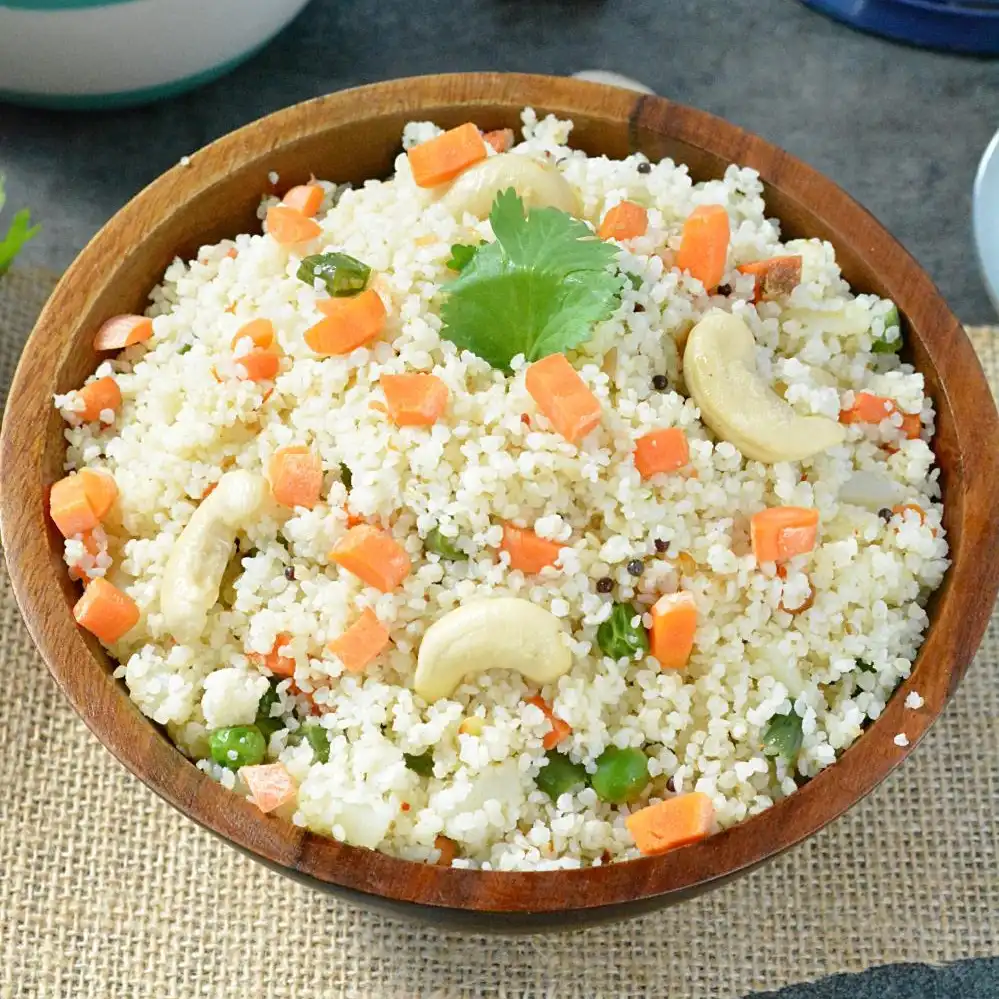
6. Lauki (Bottle Gourd) Curry
Light, soothing, and perfect for fasting. Pair it with rajgira roti or vrat rice for a wholesome meal.
Ingredients:
- 1 cup bottle gourd (chopped)
- 1 cup curd
- 1 tsp ghee
- 1 tsp cumin
- Rock salt, green chilies
Recipe:
- Heat ghee, sauté cumin and chilies.
- Add lauki and cook till soft.
- Add whisked curd and cook on low flame for 5 mins.
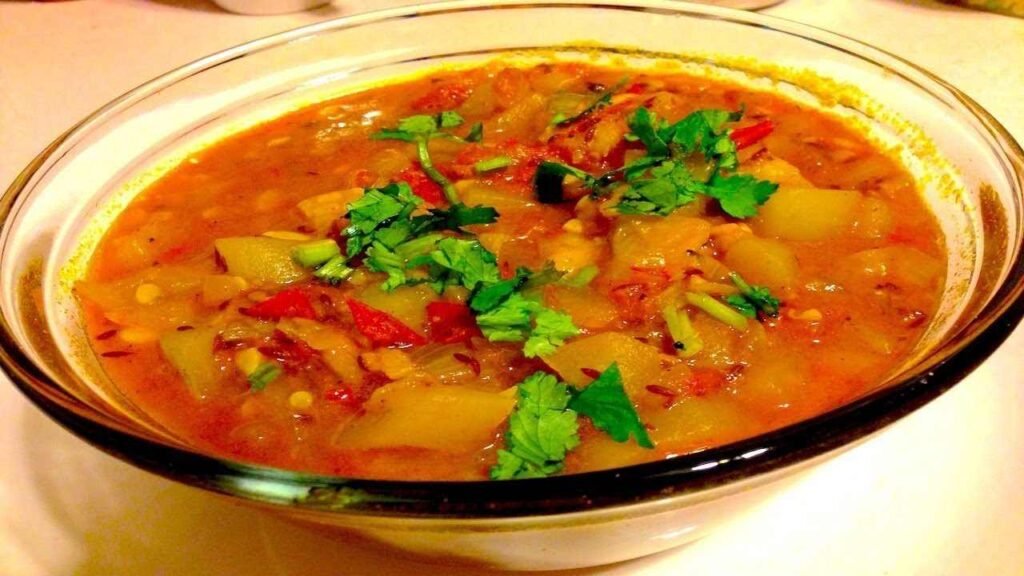
7. Sabudana Tikki
Crispy outside, soft inside—these tikkis are made from sabudana, potatoes, and peanuts.
Tip: Shallow fry instead of deep-frying for a healthy option.
Ingredients:
- 1 cup soaked sabudana
- 2 boiled potatoes
- ¼ cup crushed peanuts
- Green chilies, salt
Recipe:
- Mix all ingredients, form tikkis.
- Shallow fry till golden and crispy on both sides.
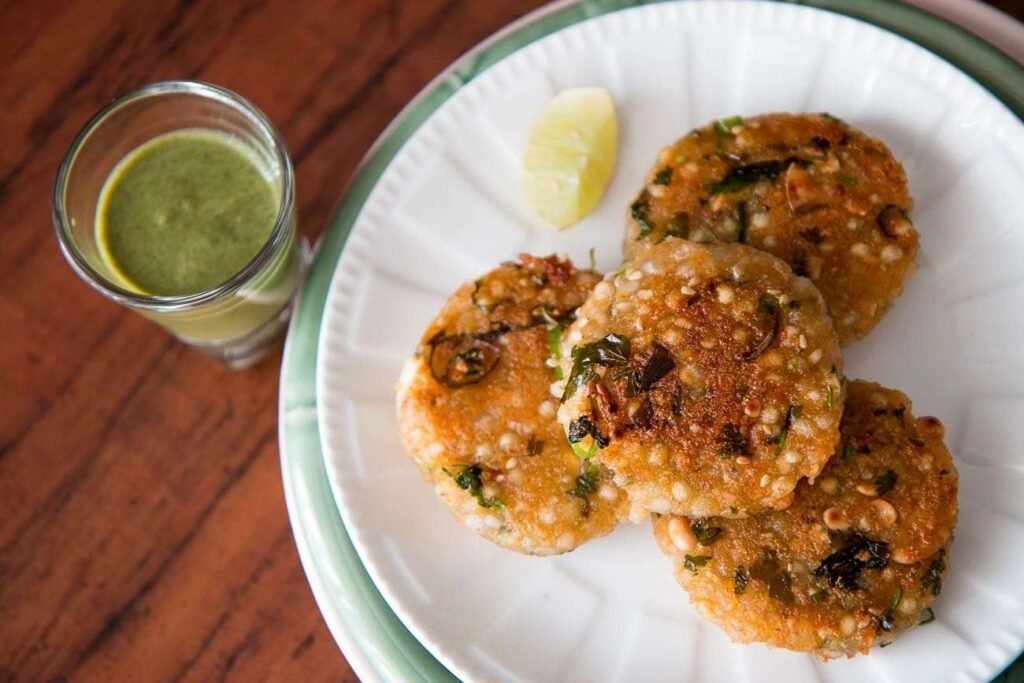
8. Paneer Makhana Curry
A creamy curry made with paneer and fox nuts cooked in vrat-friendly spices. Serve with rajgira roti or sama rice.
Ingredients:
- 1 cup paneer cubes
- ½ cup makhana
- 1 cup curd
- 1 tsp cumin
- Rock salt, vrat spices
Recipe:
- Roast makhana lightly.
- Sauté cumin in ghee, add paneer and makhana.
- Add whisked curd, spices, cook for 8–10 mins.
9. Sweet Potato Chaat
A tangy, spicy, and filling dish made from boiled sweet potatoes, rock salt, and lemon juice. Perfect for light dinner!
Ingredients:
- 2 sweet potatoes (boiled, chopped)
- Rock salt, lemon juice
- Green chilies
- Chopped coriander
Recipe:
- Toss boiled sweet potato with salt, lemon juice, and chilies.
- Garnish with coriander and serve.
10. Singhare ke Aate ka Halwa
This water chestnut flour halwa is a quick, sweet treat that adds a festive touch to your vrat thali.
Ingredients:
- ½ cup singhare ka atta (water chestnut flour)
- 2 tbsp ghee
- 1.5 cups water
- ¼ cup sugar
- Cardamom, chopped dry fruits
Recipe:
- Heat ghee, roast flour until golden.
- Add water slowly while stirring.
- Add sugar and cardamom. Cook till halwa thickens.
- Garnish with dry fruits.
Do’s for Janmashtami Fasting
- Start with a Sankalp (Vow): To Begin your fast, offer a prayer and take a vow to observe the fast with devotion.
- Consume Sattvic Food: Include light, pure, and non-grain items including fruits, milk, curd, makhana, and sabudana.
- Stay Hydrated: Drink water, milk, or fruit juices to stay active throughout the day.
- Engage in Devotion: Spend this day chanting bhajans, reading the Bhagavad Gita, and meditating to deepen your spiritual connection and distract yourself from materialistic things.
- Break the Fast After Midnight: Traditionally, devotees end their fast after the midnight aarti, marking Lord Krishna’s birth.
Don’ts for Janmashtami Fasting
- Avoid Onion and Garlic: Do not consume these items as they are considered tamasic and not a part of vrat meals.
- Stay Away from Grains & Pulses: Replace these items with vrat-friendly flours like kuttu, singhara, or rajgira.
- Don’t Overeat During Fast: Keep your meals light and simple to maintain the essence of fasting.
- Avoid Negative Thoughts: Fasting is about mental purity and physical discipline, so stay calm and positive on this day to maintain peace. Chant “Hare Krishna!”
- Don’t Break the Fast Before Midnight: Wait until Krishna’s birth time to honor the vrat completely.
Takeaways
Welcome this divine festival of Janmashtami with devotion, love, and harmony. By following the rituals and observing the fast with sincerity, we can experience a deeper divine connection with Lord Krishna.
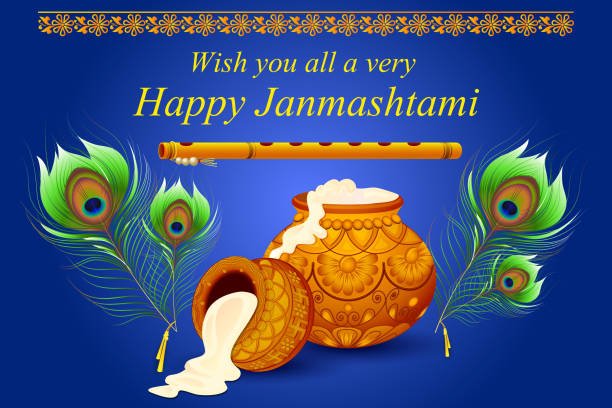
May the blessings of Lord Krishna fill your life with happiness, love, peace, and prosperity.
Wishing you a blissful and spiritually enriching Janmashtami!
Master Festive Recipes & Culinary Skills with NFCI!
At NFCI (National Finishing and Cookery Institute), we offer professional culinary courses where you can learn everything from traditional festive dishes to global cuisines under expert guidance.
- 35+ Years of Excellence in culinary arts and hospitality education
- Government-Approved Courses
- Expert Chef Faculty
- Modern Kitchens & practical-based learning
- 100% Placement assistance
Apply today and turn your dream of becoming a professional chef into reality!




